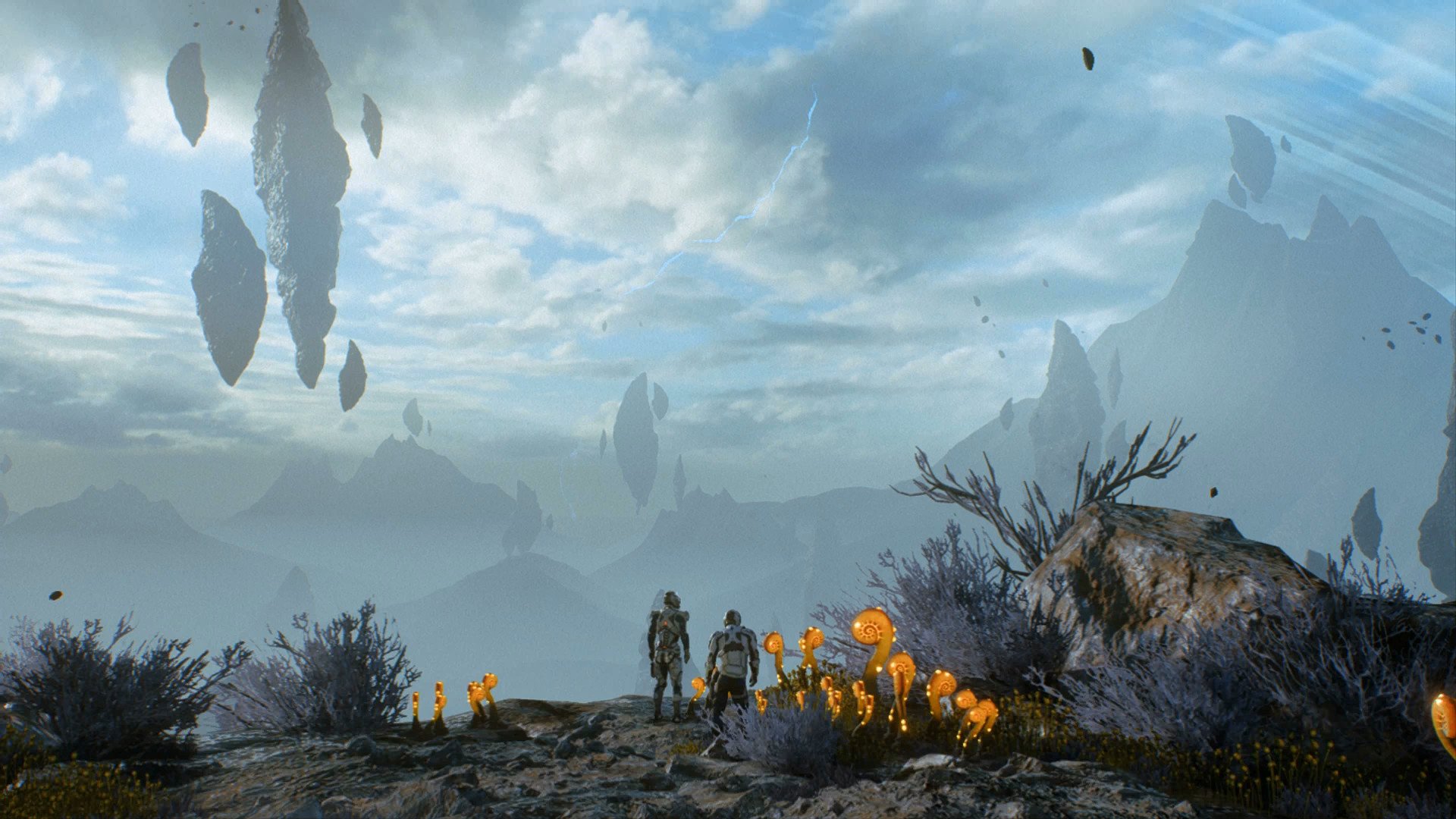Mass Effect: Andromeda is already proving controversial. If you're a big fan of the franchise, either you've already played the trial on EA Access, or you might have seen the memes dominating the airwaves, emphasizing the game's sub-par character animations. My time with Andromeda is drawing to a close, and we're ready to issue our full report on the game's triumphs and failings ... many failings.
Updated March 22, 2017: This review has been significantly updated and scored based on our final experiences with the game.
Which version of Mass Effect: Andromeda is best for you?
Mass Effect: Andromeda review in brief
To put it bluntly, Mass Effect: Andromeda seems like the victim of its own ambitions. The developer, BioWare, cited the likes of The Witcher 3 as the inspiration for its open world and quests, but it very barely reaches beyond Dragon Age Inquisition's grind-heavy, narrative-thin open world areas.
The open world areas, so far, have been dotted with pointless fetch quests, copy-and-pasted formulaic missions, and color-swapped creatures. Don't even get me started on the bugs, hitching, frame-rate issues, and other engine anomalies.
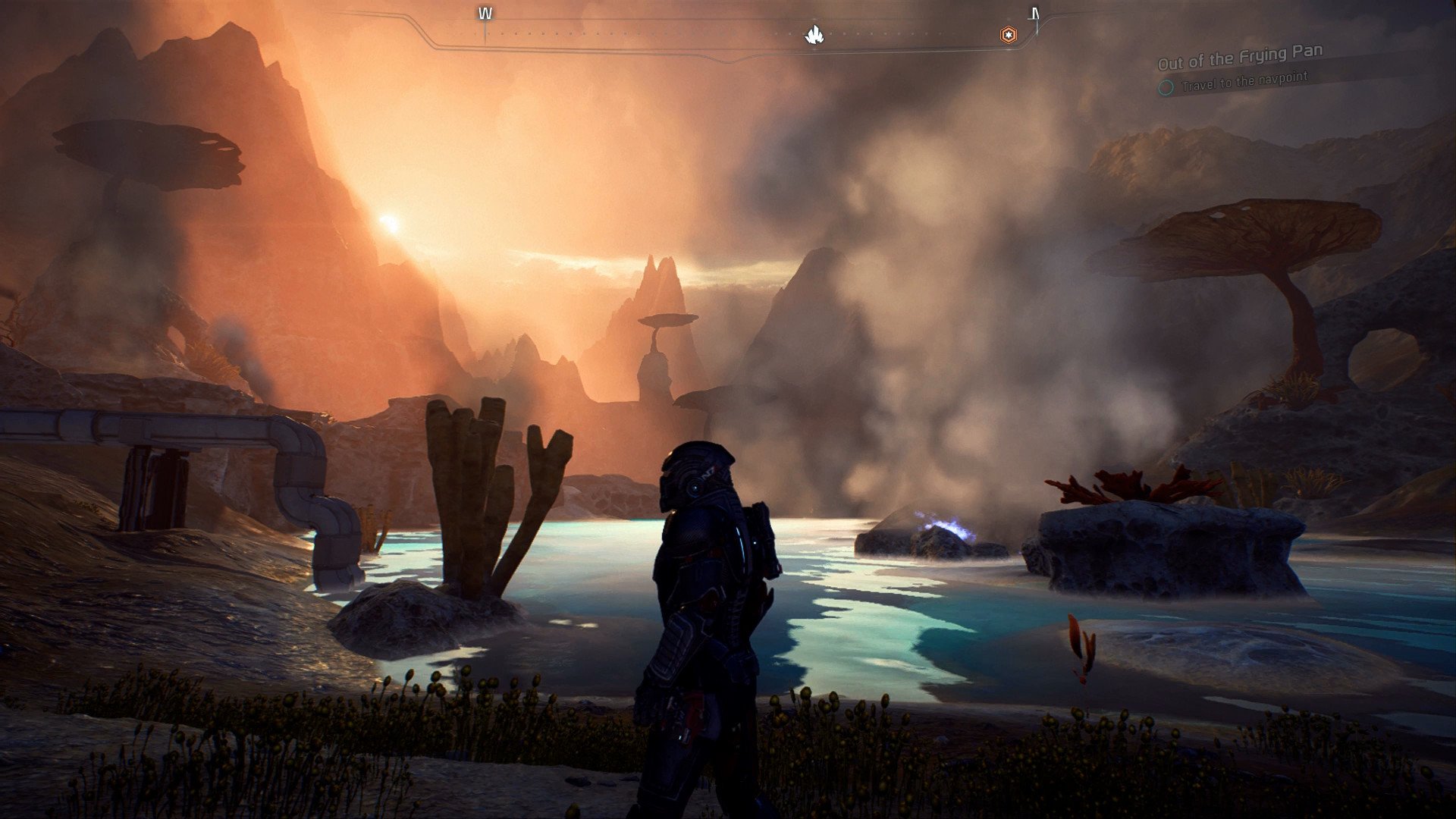
Those are the negatives, though. Mass Effect: Andromeda's combat has been liberated from the rigidity of a typical cover shooter. Aerial dodging, jet packs, ground attacks, and a huge, huge repertoire of active abilities represent the greatest combat the franchise has ever seen. And those biotic combos are still, so satisfying.
The story, the cast and writing have generally proven to be engaging.
Andromeda's combat extends into its multiplayer mode, which pits up to four players in Horde-like arena battles, complete with plenty of opportunities for character progression and co-op sci-fi shooter tomfoolery.
As with any Mass Effect game, most fans are here for the narrative and characters, and the core experiences are solid. Sadly, though, they're strewn through a lens of bugs and spread out across a galactic amount of filler, owing to the game's terrible open-world gameplay. And those character animations and glitches are as bleak as the internet says, sometimes worse.
Meet the characters of Mass Effect: Andromeda
Peebee is far more complex than the trailers led me to believe. Drack is a worthy Wrex stand-in with often hilarious dialogue, and the game's main antagonist, The Archon, is as mysterious as he is chilling.
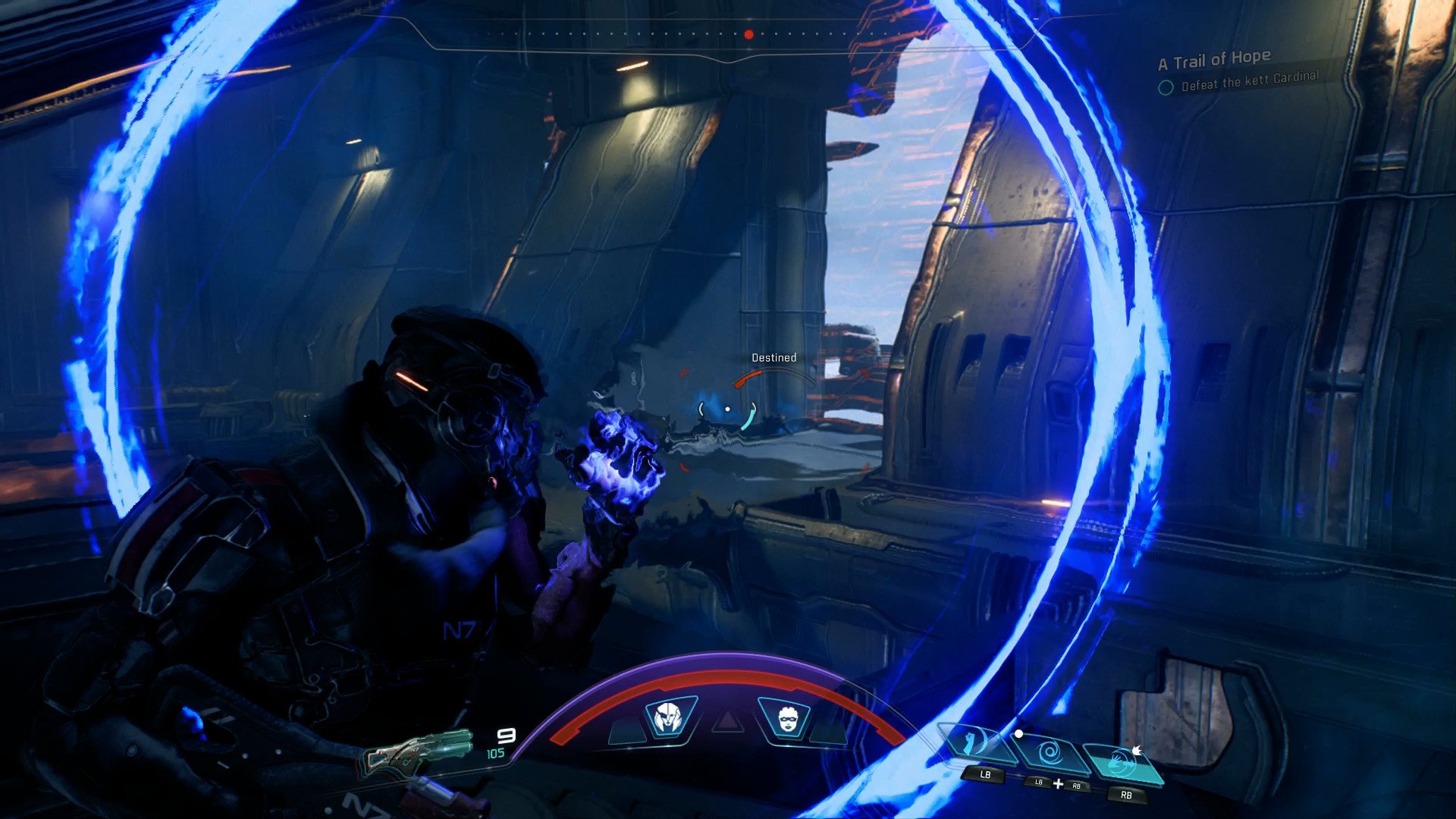
Despite the bland open-world gameplay and the litany of bugs (lots of bugs, hopefully, fixable bugs), it's the intriguing story, quality main missions, and infectious combat that kept me going. Beneath it all, Andromeda is definitely Mass Effect, but it's painful to think about what could have been.
Design and setting
Given the uproar, I feel the need to address this aspect of Andromeda first. Yes, its character presentation is patently atrocious. It's not just the odd animations, caffeine-addled lack of eye contact, or the bland modeling but also the weird bugs that seem to plague BioWare's real-time conversation system. The Xbox One's last minute 775MB patch didn't fix matters, either.
Character models have appeared twice during dialogue scenes, several times. I've had NPCs either walk through me or even wander in from the open world and kill me, mid-conversation, leading to a bug that required a system reset. I've seen conversation characters stuck in the wrong animations for their situations. And I've had conversations occur out of quest sequence, leading to truly confusing moments (and, yes, a few broken, incompletable missions).



It's utterly maddening because it does the game's writing and voice acting a huge discredit, as it has generally been quite good. Every time one of your crew members appears in a conversation with a bugged doppelganger, it rips you out of the immersion, which makes it harder to connect with these new characters. A tender moment with one of the new crew mates, which was well written, flanked by somber music, was instantly destroyed by a glitch that caused his model to become stuck. This should be basic stuff for BioWare.
Considering how frequent the bugs are, and considering how expensive Andromeda is, I think it's more than fair to expect more of one of the biggest video game publishers in the galaxy. We can only hope that subsequent patches fix these issues.
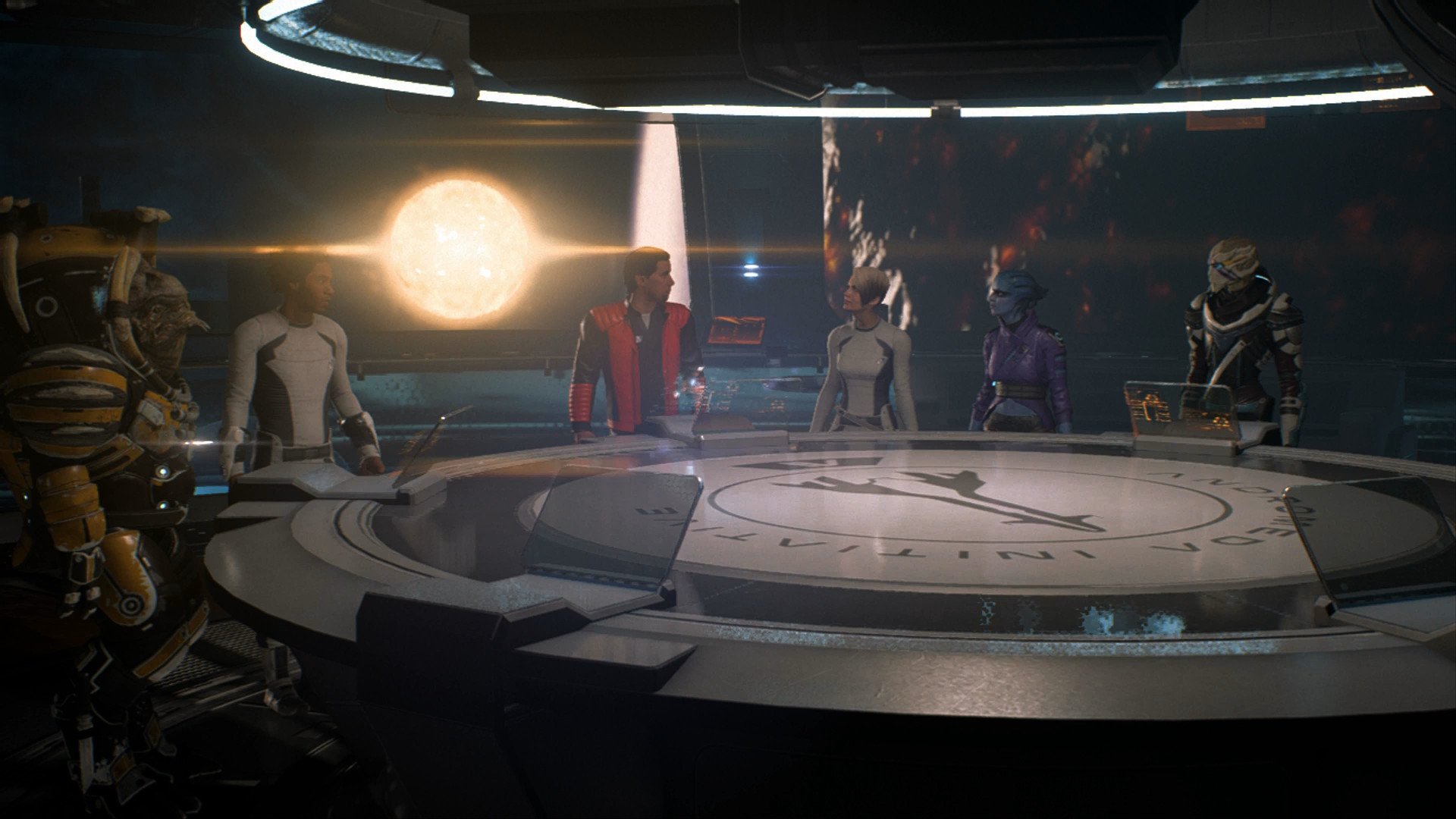
You'd have thought BioWare would have let its imagination run wild on Andromeda's creatures, but instead, we just get missed opportunities.
Beyond conversational presentation, Mass Effect: Andromeda holds its own when it comes to environment design and art direction. Vistas of alien worlds, black holes with gravitational lensing, gigantic alien plants, and other warped, astronomical oddities make Andromeda as majestic as it is hostile. But the further you progress through the game, the realization begins to dawn that you're fighting the same five color-swapped alien creatures over and over, despite being on planets light years apart.
You'd have thought BioWare would have let its imagination run wild on Andromeda's creatures, but instead, we just get missed opportunities. You will get to scan color swapped alien gorillas, rhinos, and velociraptors, that inexplicably appear on planets light years apart. It makes the exploration aspect miserably underwhelming.
At least the music and sound design are incredible, buzzing with signature otherworldly Mass Effect electronica. Biotic combos rip through the air with a satisfying thunderclap, and each weapon has a unique, impactful voice.
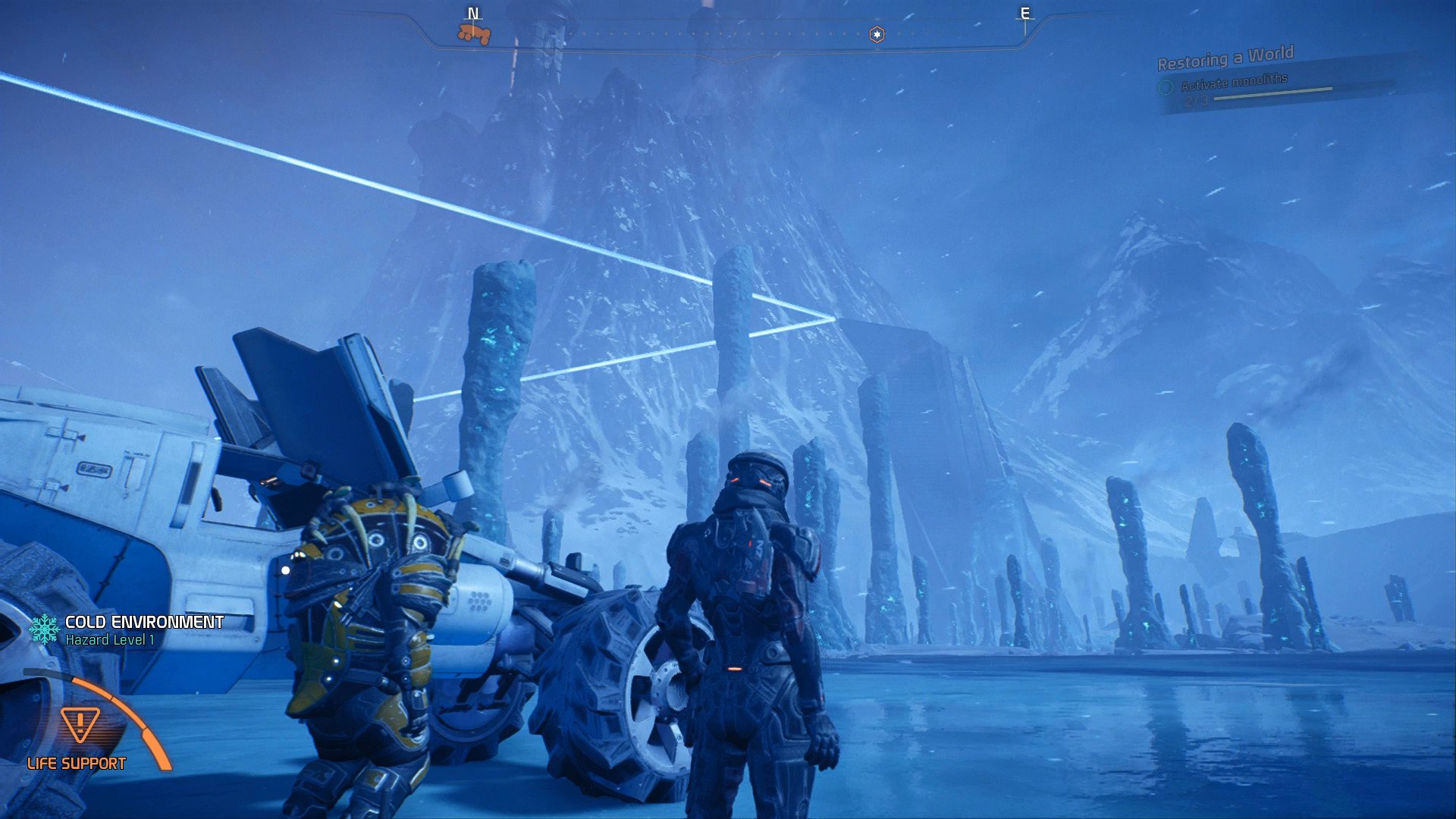
As beautiful (and repetitive) as Andromeda's worlds are, they can drop the Xbox One's frame rate to a crawl. Speeding across the wastes in the Nomad planetary rover also can causes the game to hitch, freezing while it loads additional terrain. It's clear that BioWare hasn't spent enough time optimizing the game's engine.
Mass Effect: Andromeda should have been delayed to repair these issues, because underneath it all there lies a wonderful space adventure begging to be treated with respect.
Combat gameplay
The best aspect of Mass Effect: Andromeda is its combat. It has been completely unshackled from the narrow lens of the third-person corridor shooter and takes advantage of its open-world verticality to deliver something far more versatile. You can now leap, aerial dodge, and melee attack from above, and even hover mid-air while aiming. You can create the ultimate space wizard of your dreams, or live out a Boba Fett fantasy with jet packs and a flame thrower. Or hey, you could do both at the same time.
I can upload this fun clip of hilarious biotic combos now. My in-progress Mass Effect Andromeda review is live: https://t.co/D16zv1STNu pic.twitter.com/97zdCK6YGh— Jez 🎮🦂 (@JezCorden) March 20, 2017
Owing to plot reasons, Mass Effect: Andromeda is far more lenient with its class-based structure than previous games.
Mass Effect: Andromeda's combat is as fast-paced, satisfying and engaging as ever.
As you level up, you gain access to points that you can spend on any class's abilities. These include franchise staples such as the tactical cloak's invisibility, biotic techniques like throw and singularity, and also a whole range of new ones, such as the flamethrower. The more points you spend in any class increases your proficiency with those abilities, whether they're tech, biotic "spells," or different types of weaponry.
You can go all-in with a single class, too. I'm building myself up as a "Biotic God" at the moment, and have unlocked several ranks of passive damage boosts to my skills. If you prefer versatility, that's just as viable a strategy, and you can limit the impact of any shortcomings using armor and weapon mods.


Skill combos have returned with gusto. You can set an enemy on fire with "Incinerate," then cause an explosion with a biotic throw. Many abilities also have alt-fire modes as well. Biotic pull allows you to hold an enemy in mid-air, and use him as a projectile against other hostiles.
The active cover system has been replaced with something more automated. Ryder and your two squad mates will crouch behind appropriate objects dynamically, which can be a little awkward at times. There are plenty of skills and abilities you can use to mitigate the need to use cover, though. Most of the time, I found myself jumping around, dodging, and aerial shooting instead of ducking down. Certain enemies, though, pretty much force you to at least hide to replenish your shields.
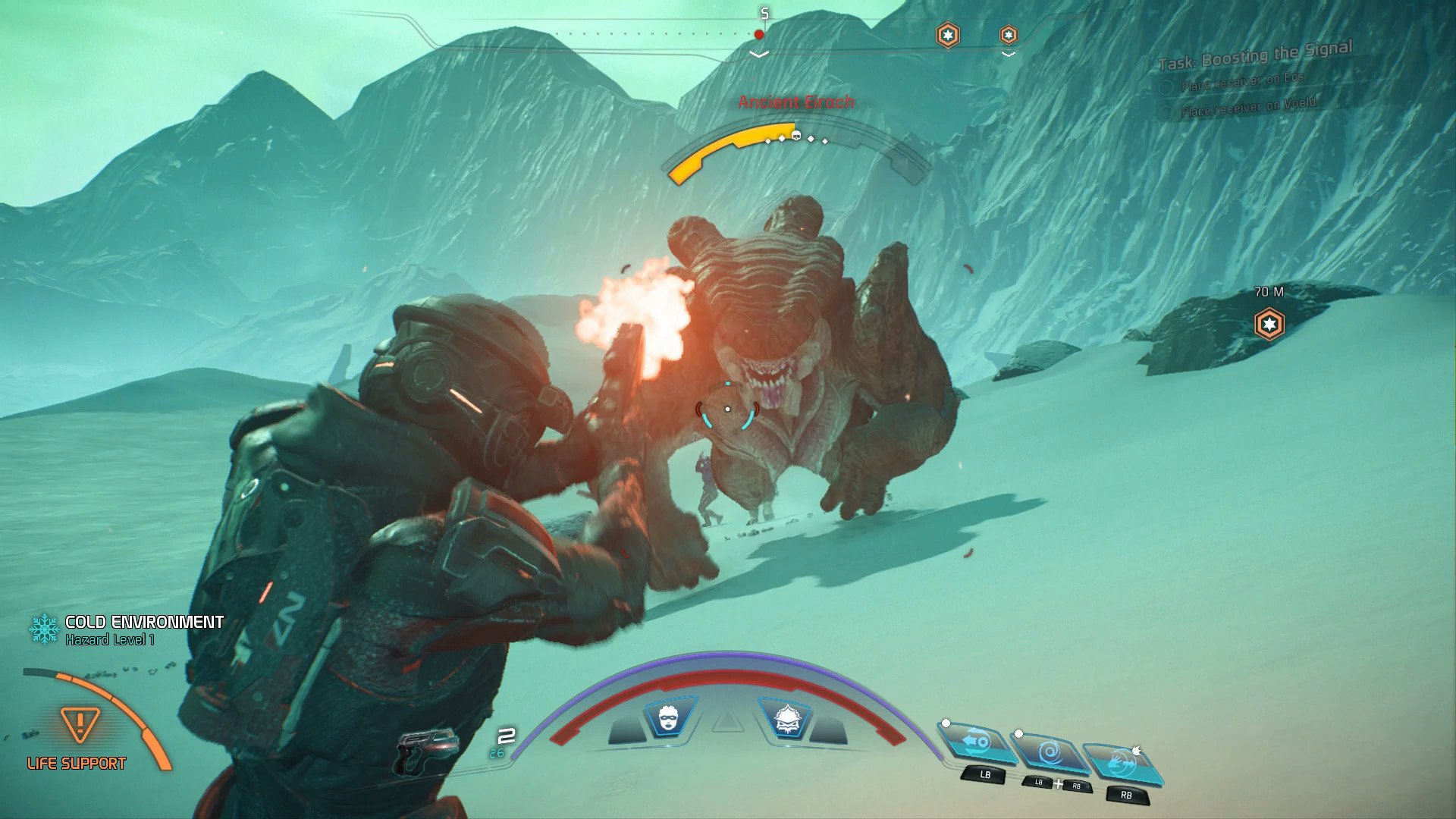
When it comes to enemy types, Andromeda mostly follows the previous game's formats. Some enemies have armor, while some have shields. The game's various tools and abilities allow you to circumnavigate enemy defenses, forcing you to change strategy on the fly. Sadly, combat isn't immune to the game's general lack of polish, and enemies can become stuck in terrain, freeze up altogether, and can even disappear randomly. Nothing has been too game breaking, though, and the infectious fun far outweighs the issues I've experienced in this area. And there are always patches.
Mass Effect: Andromeda's combat is as fast-paced, satisfying and engaging as ever, and serves as one of the game's greatest aspects. However, the same cannot be said for its open-world gameplay.
Open-world gameplay
BioWare went on record to state that Andromeda would draw upon inspiration from The Witcher 3 when it comes to designing a "meaningful" open world, complete with impactful side objectives that build on criticisms leveraged at its previous game, Dragon Age Inquisition. Seriously, if you're going to compare your open world to The Witcher 3's, you better be able to back it up.
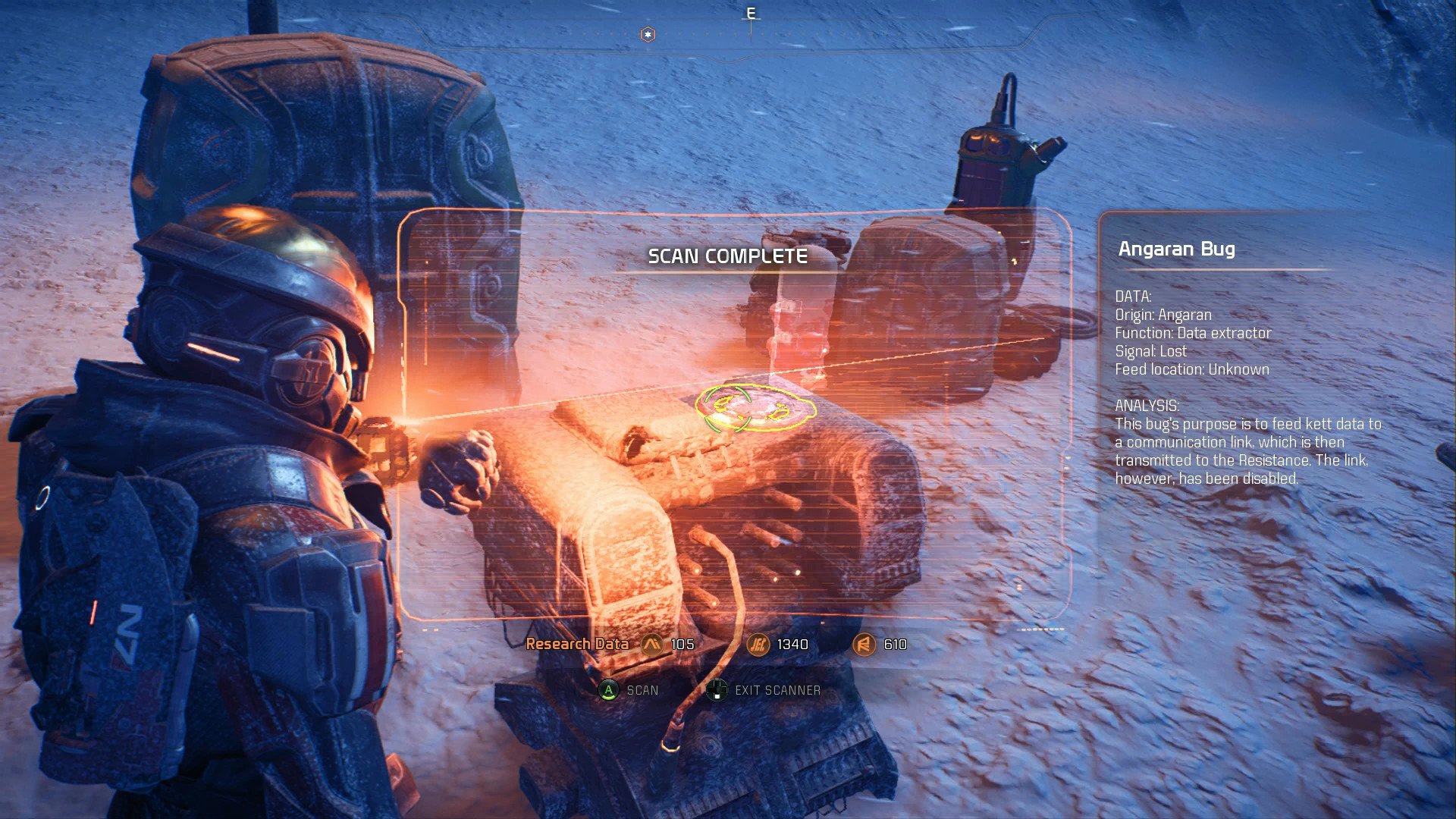
Despite BioWare's claims, Mass Effect: Andromeda's open world falls straight into the black hole that is quantity over quality. None of Andromeda's side quests are even vaguely interesting, nor memorable. Sometimes, they are just plain idiotic. They amount to go here, fetch this, click on those, scan copies of this, with little narrative, intrigue or flavor to back them up. Some feel as though they'd been thrown in haphazardly to nod at events from previous games, even if they made virtually no sense. Andromeda is also addicted to sending you to scan things, repeatedly, with droning MMO-like abandon.
Andromeda is addicted to sending you to scan things, repeatedly, with droning MMO-like abandon.
The few quests on the game's first world, Eos, that were interesting, reappeared again on the game's second world, Voeld, practically copied and pasted. Despite assertions that BioWare "listened to feedback" concerning its previous game, Dragon Age Inquisition, I'd say Andromeda represents a step backwards for its repetitive, grinding quests that are little more than filler.
Thankfully, the game's combat and main story missions more than make up for Andromeda's open world maps. And the vast majority of the open world missions are entirely optional. When you prioritize story ops, you will find a huge abundance of quality missions, and character-specific quests that speak to the quality Mass Effect fans will expect. Liam's loyalty mission is suitably hilarious and well written, granting insight into the character with some genuine laugh-out-loud moments. These are the best aspect's of Andromeda's mission delivery.
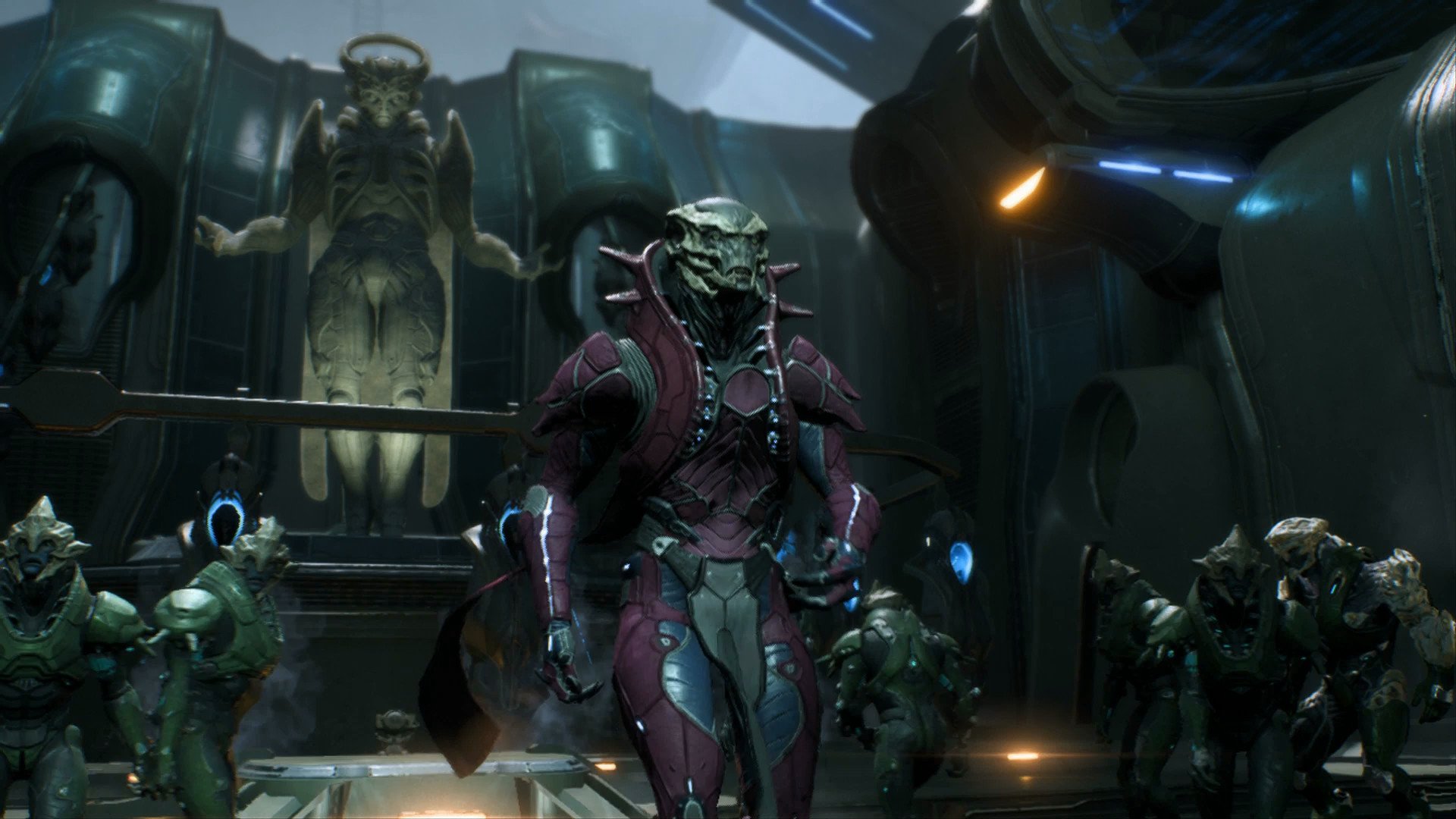
I have fond memories of exploring Mass Effect 1's planets in the Mako. Sometimes driving around in space, grinding mindlessly, is simply fun for the sake of it. Open world fans may disagree, but I feel as though it only detracts from the experience in Andromeda. It needlessly stretches the gap between the game's higher quality content and adds virtually nothing of value in between. It even has Ubisoft-style "unlock several of these" on every planet, which just feels so dreadfully uninspired. I find myself sorely missing Mass Effect 2 and 3's mission structure.
Story and setting
Mass Effect: Andromeda is, as its name suggests, set in the Andromeda galaxy. A movement known as the Andromeda Initiative, sought about building a flotilla of human and alien colonial ships, set to travel for over 600 years across dark space to leave the Milky Way. The events of Mass Effect 2 and 3 are largely unknown to the colonists.
A lot of emphasis is placed on the pioneering spirit of the Initiative's citizens, of which there are tens of thousands. Some are scientists seeking new knowledge, others are businessmen seeking profit, and others are simply adventurers seeking a new frontier. The main character, known by his or her surname as Ryder in the game, came along with their father and twin, inspired by the explorers of old.
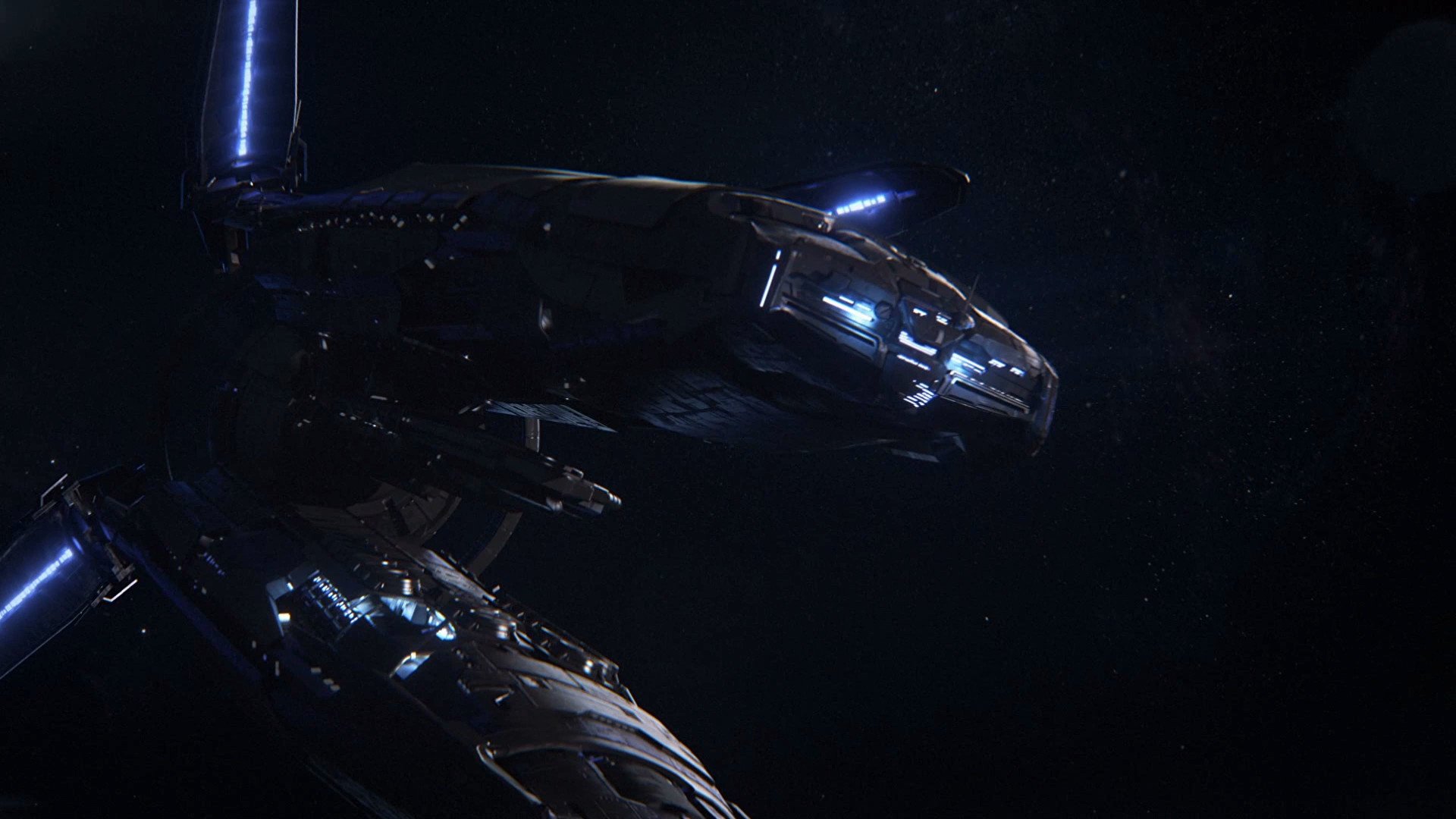
The Andromeda Initiative is led by a Pathfinder, which in true BioWare fashion, serves a special place in the narrative. The Pathfinder's job (your job) is to inspire the Andromeda Initiative by discovering new worlds for Milky Way species' colonization.
Mass Effect: Andromeda continues BioWare's tradition for great character writing. But it's not all good news.
Very early on, however, the Initiative identifies that much of the worlds they thought were habitable turned out to be ... a little less so. Something nefarious is taking place on Andromeda, and if the Milky Way pioneers are to survive, it falls on the Pathfinder to solve the mess gripping the stellar cluster.
BioWare could have done the cheap-and-easy thing and banked on nostalgia, but Andromeda diverges quite heavily from the events of the previous trilogy. So far, I've found only minor references to previous characters and circumstances, save for important lore aspects. Andromeda is a truly standalone experience, requiring no prior knowledge of the franchise.
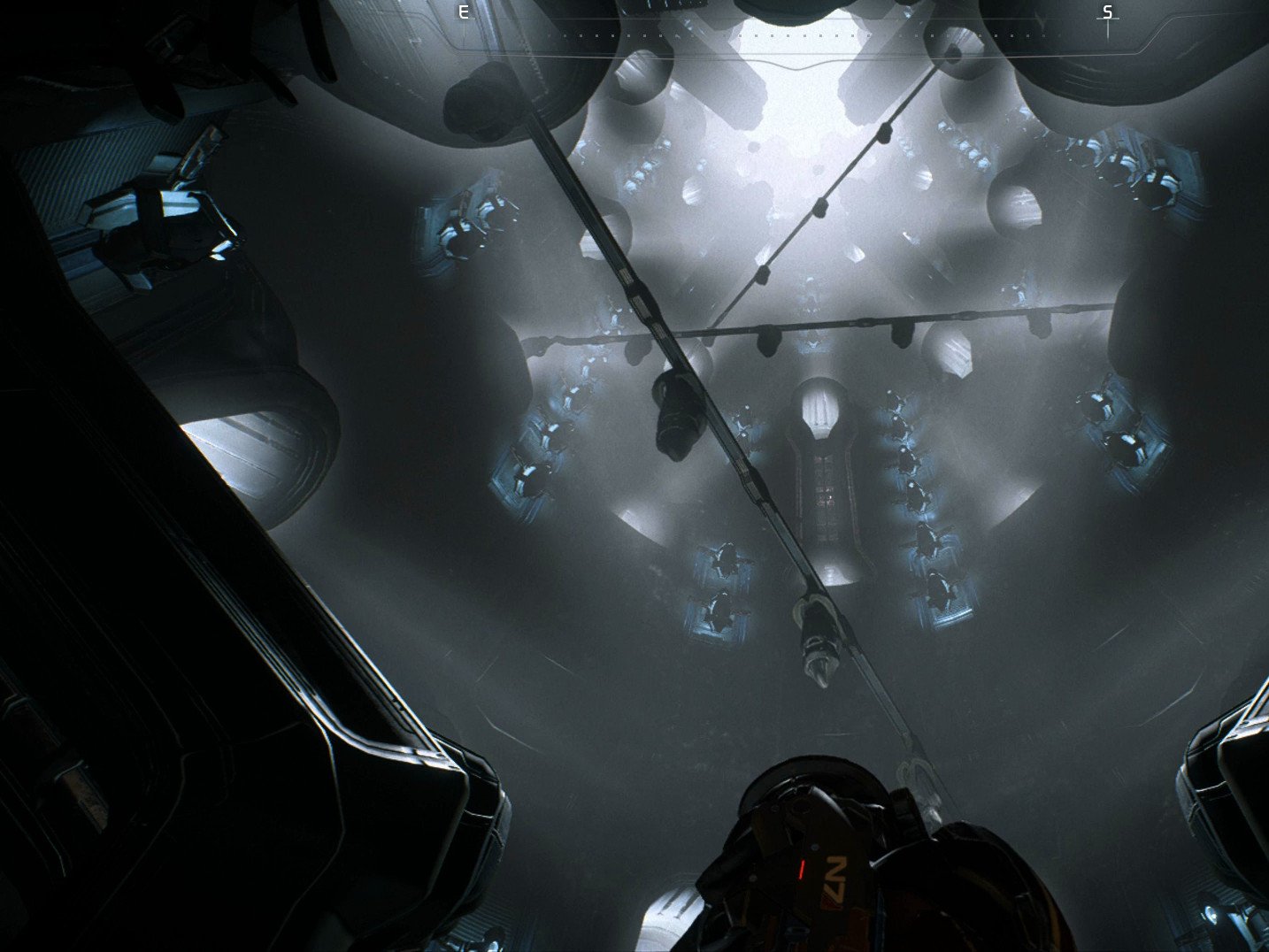
It's crazy to think, but Mass Effect came out almost 10 years ago. The rich characters, malevolent villains, and unique world propelled BioWare to the top of the RPG pile, and Mass Effect: Andromeda continues BioWare's tradition of great character writing.
But it's not all good news.
I've seen some outlets bash Andromeda's writing, but I've found myself laughing out loud at certain quests, genuinely intrigued by the stories of certain characters, and fully engaged with the game's plot. The narrative team did a great job with Andromeda over all, with a shift in tone from the previous trilogy's tendency towards relentless bleakness, delivering something a little more hopeful and light hearted.
Without giving too much away, you discover early on that your target location — the Heleus cluster of Andromeda — is beset by a malevolent nation known as the Kett. The Kett bases I've invaded offer tantalizing (and horrifying) glimpses into one of the franchise's most evil villains yet.
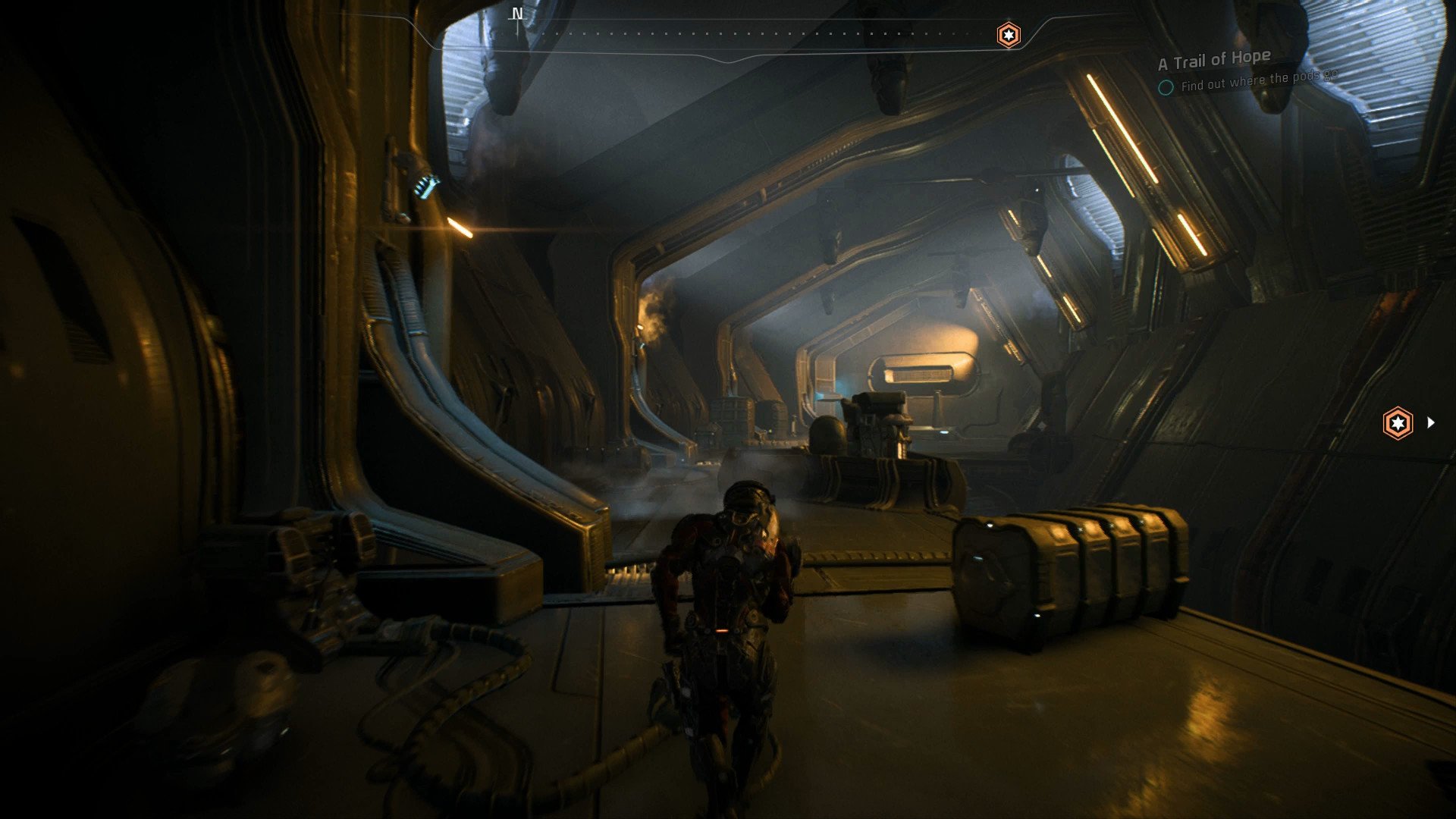
Led by an entity known only as the Archon, the creepy reptoid aliens attack humanity at first contact, offering no explanation or mercy. Solving the mystery of Kett's aggression and motives has so far formed the main arc of Andromeda's story, complete with the signature BioWare curveballs.
Andromeda has the building blocks of an incredible story, but it's wreathed in systemic issues.
The other part of the narrative discusses the complexities of setting up a new nation, sharing parallels with the likes of Battlestar Galactica (2004), and the difficult lives humans suffer in Star Wars, living on the frontiers of the Outer Rim.
Andromeda has the building blocks of an incredible story, but it's wreathed in systemic issues that probably stem from overexertion. The game would have benefitted from a sharper focus.
My biggest criticism of Mass Effect: Andromeda's story, beyond the bugs, pertains to the lack of branching narrative. Very few of your decisions seem to have impactful consequences, which is a stark contrast to previous games in the series.
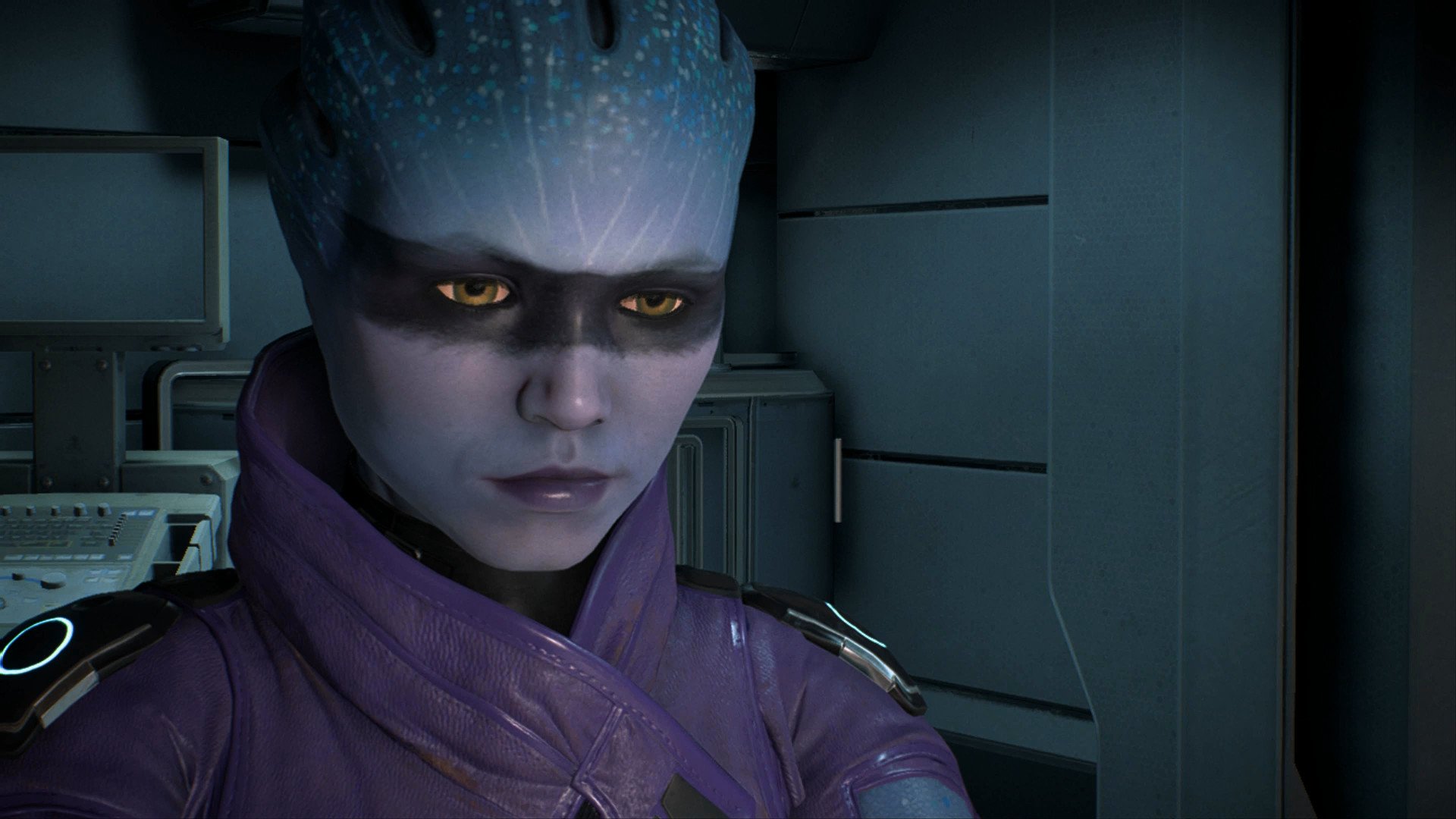
For Andromeda, BioWare ditched the binary Paragon/Renegade dialogue choices the series was known for. Instead, it went for a personality-based system, similar to Dragon Age Inquisition. I feel as though I can no longer play the way I want to as a result of this, because my decisions tend to no longer straddle moral extremes, and instead lie between fairly unbinding, practical, and "safe" choices.
Don't expect to play the bad guy in Mass Effect: Andromeda. You can't.
It's subjective, but it bugs me how nice Ryder is, and how little control you have over his personality. So far, it feels like there's a missed opportunity to be an imperial colonialist versus an intrepid explorer. Simply put, don't expect to play the bad guy in Mass Effect: Andromeda. You can't.
Warning: There are minor spoilers in this paragraph. Additionally, Mass Effect: Andromeda just feels all too familiar. You're in a completely new galaxy, but there are very few new alien races and civilizations to get acquainted with. Much of the Heleus Cluster is populated with the Kett and Angara races, and tens of thousands of misplaced Milky Way races that came along with the Andromeda initiative. Why is Kadara Port run by humans, and not some crazy Andromeda squid-like alien people? Why are you fighting benevolent Krogan warlords again in an all-new galaxy? Who settled at New Tuchanka no less, named after their planet from the previous game. Kadara Port feels like Omega from Mass Effect 2, only lacking in depth and ambiance.
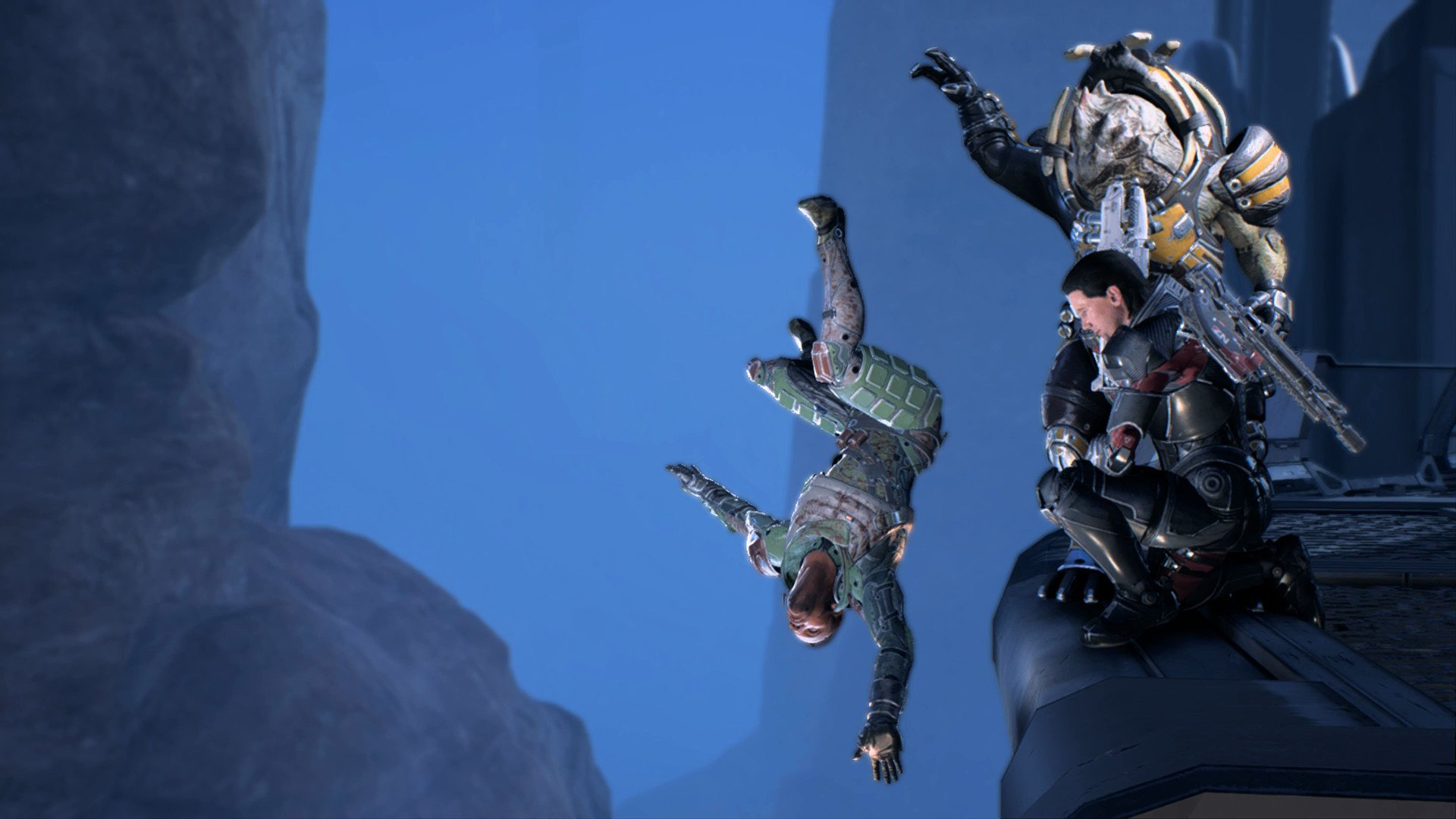
Considering it's an all-new galaxy, not a great deal of Mass Effect: Andromeda's story feels new. In fact, much of it just feels the same, only worse.
A lot of the story's factions should be new aliens, rather than anarchistic Milky Way races from the previous trilogy, with vague motivations. Even the two new races are humanoids, wielding assault rifles, complete with familiar cultural norms and societies. I can't help but feel this lack of creativity is a compromise from switching the game over to ambitiously large open world segments, reducing the focus the game sorely needed to get to a higher level.
Final thoughts
Despite these complaints, Mass Effect fans will enjoy what Andromeda has on offer. The main characters are interesting and diverse (albeit familiar), the plot is suitably mysterious, and the gunplay and powers are as satisfying as ever. But I also feel as though those same fans deserve better for their hard-earned cash.
This is by far the least optimized, most buggy entry in the series. The sheer volume of glitches, animation problems, frame rate issues, and weird hitching lag plagues the entire experience, and it's a damn shame.
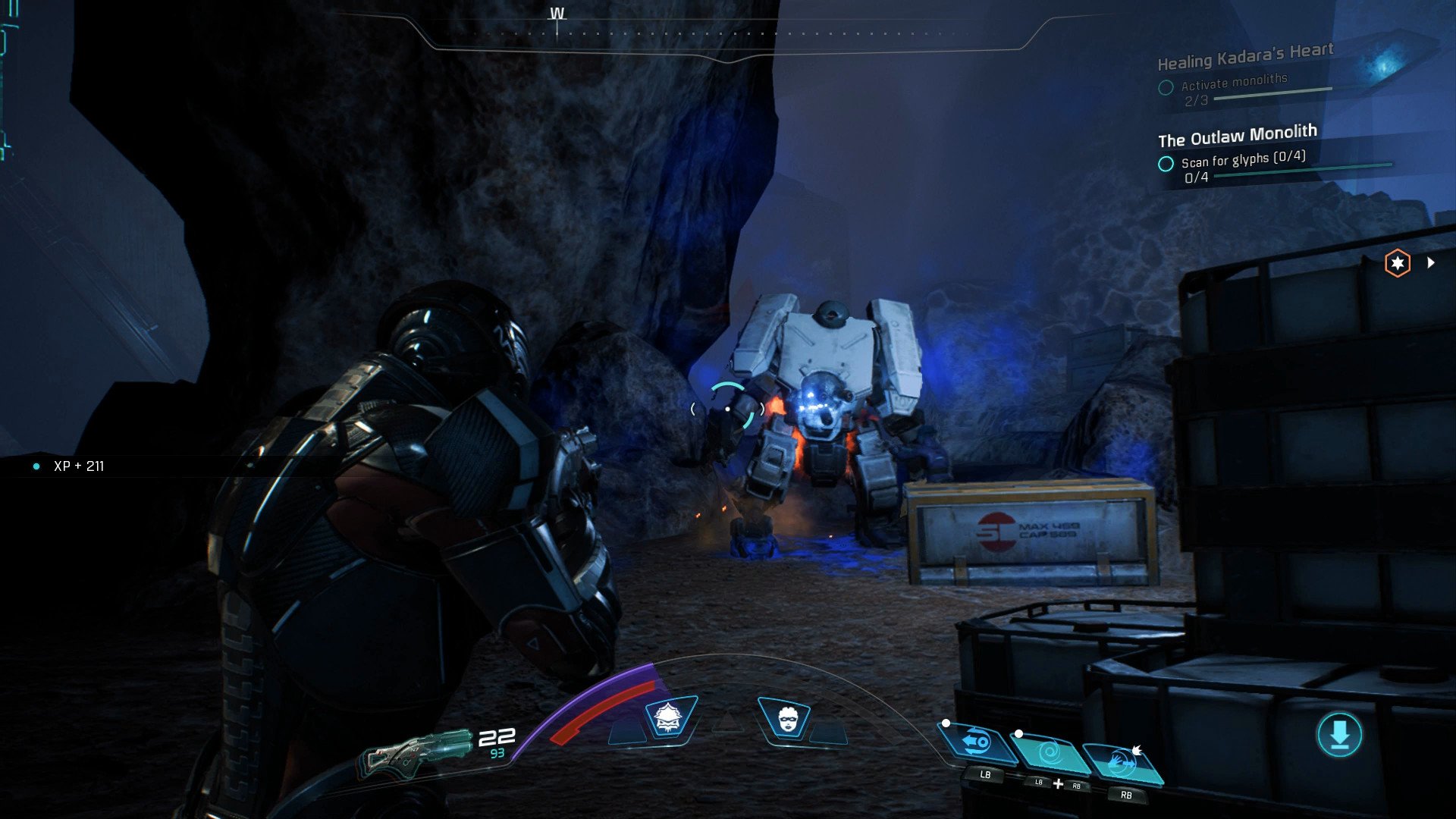
I was hoping to be able to say that BioWare's last minute patch would fix the bugs I was experiencing, but it's not the case. The company has shown a willingness to repair the issues with the game, but if you want to play it unspoiled, I'd wait a few months.
An amazing game lurks beneath the surface of Mass Effect: Andromeda.
I enjoyed upgrading my gear using the game's crafting system, smashing enemies with biotics never gets old, and exploring the game's large galaxy map is as inspiring as ever. That is, at least until you land on a planet and find yourself forced to scan 10 space weevils.
Right now, Andromeda feels like a victim of its open world ambitions, chasing The Witcher 3 rather than playing to the franchise's strengths. Creativity and polish have undoubtedly suffered due to the game's diffuse focus.
Pros:
- Great characters and story.
- Fun, engaging "classic" main missions.
- Industry leading third-person shooter combat.
- Surprisingly rich multiplayer.
Cons:
- Huge amount of content, but most of it is bland filler.
- Insane amount of bugs, glitches, and optimization issues.
- General lack of creativity, including few new alien races.
This game simply might not have been ready to emerge from its cryo-sleep, but the building blocks of an amazing game reside in Mass Effect: Andromeda. Hopefully, it will improve with future updates.
Mass Effect: Andromeda is available now for Xbox One, PC and PlayStation 4.
This review was conducted on Xbox One using a copy purchased by the writer, with early access provided by EA.

Jez Corden is the Executive Editor at Windows Central, focusing primarily on all things Xbox and gaming. Jez is known for breaking exclusive news and analysis as relates to the Microsoft ecosystem while being powered by tea. Follow on Twitter (X) and Threads, and listen to his XB2 Podcast, all about, you guessed it, Xbox!
